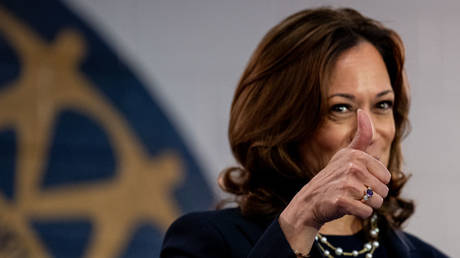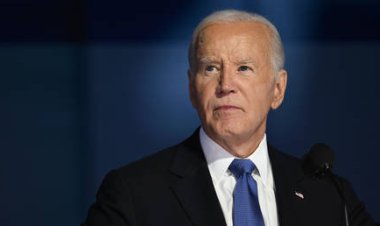Kamala Harris Has Strong Prospects of Winning the White House
Biden's Vice President emerges as a formidable candidate, catching Donald Trump off guard, which highlights the latter's own popularity issues.

Why has there been such a dramatic shift in American politics?
The catalysts include Joe Biden stepping down due to his diminishing capabilities, the surprising vigor and effectiveness of Harris's campaigning which has rejuvenated the Democratic Party, and the increasingly negative and ineffective campaign efforts from a weary Donald Trump following an assassination attempt.
Before Biden's resignation announcement on July 21, most political analysts predicted a decisive Trump victory in November. However, Biden's exit from the race and the swift endorsement of Harris as the Democratic nominee changed the landscape almost overnight, bypassing a lengthy primary process.
Though slow to remove Biden post-his COVID-19 contraction, which severely impacted his electoral viability, the Democratic Party's quick endorsement of Harris as his replacement marked a pivotal change.
Biden's delay in stepping down ultimately served Harris’s campaign, giving her less time to face serious criticism from Trump and the press ahead of the election.
Clearly energized, Harris has campaigned with an enthusiasm and competence that has taken both her party and a seemingly unprepared Trump by surprise.
The facility with which Harris has campaigned might partially stem from the traditionally low expectations and visibility associated with the vice presidency.
As history shows, even under-acknowledged vice presidents can emerge as formidable campaigners. Lyndon Johnson, often sidelined in his tenure as vice president, ultimately achieved a resounding victory in the 1964 presidential election.
Harris’s recent campaign trails with vice presidential nominee Tim Walz, who is proving to be a savvy choice, have attracted vast and passionate crowds. The energy differs starkly from Biden’s campaigns, with Harris and Walz managing to critique Trump effectively and project a hopeful vision for America's future, despite potential impracticalities in their economic plans aimed at easing living costs and lowering prescription prices.
Polls suggest that Harris now leads in many crucial battleground states. She has also regained traction among black and Hispanic voters and even some white voters who previously favored Trump.
This regained momentum, coupled with fresh enthusiasm from Democrats and swing voters alike, sets the stage for the upcoming Democratic Party convention in Chicago to possibly bolster her campaign further.
Trump, meanwhile, appears caught off guard by these developments. Noted Republican strategist Karl Rove highlighted Trump's unpreparedness for Biden's withdrawal and the challenges he faces against the revitalized Harris.
After laying low for two weeks, Trump’s reemergence was marked by unfocused and energy-lacking appearances, where he resorted to baseless insults and irrelevant remarks at press conferences and rallies.
Despite new advisers, including the controversial return of Corey Lewandowski, Trump’s campaign continues to stumble, exacerbated by the problematic vice-presidential pick of J.D. Vance, whose views and past comments have further alienated key voter demographics.
Trump’s inability to maintain the captivating energy of his previous campaigns and his continuous propagation of unfounded claims about electoral fraud have not only disillusioned some supporters but have also made his resurgence in the polls increasingly unlikely.
With Harris's campaign gaining strength and Trump's waning, the shift in voter sentiment suggests that Harris might very well be on her way to the White House unless unexpected events alter the trajectory of this race.As the campaign progresses, the significance of Harris's rise cannot be understated. Her ability to connect with a diverse electorate is now a critical factor as she presents herself not just as the candidate for vice president, but as a potential leader capable of addressing the urgent concerns facing the nation.
The Democratic Party, invigorated by Harris's candidacy, has shifted its focus toward addressing key issues such as healthcare, economic inequality, and social justice. The influx of donations into party coffers reflects a renewed sense of optimism among party loyalists, many of whom had felt disillusioned under Biden’s leadership. This momentum translates into a palpable energy in Harris's rallies, with supporters eager to champion her vision for a united and progressive America.
Trump's campaign, in stark contrast, seems to lack a coherent strategy to counter Harris effectively. His reliance on personal attacks and grievances—such as focusing on "Hilary Clinton’s emails" and casting disparaging remarks about Harris's intelligence—reveals a fundamental disconnect with the electorate. Voters are increasingly looking for leaders who offer substantive policies and a hopeful vision rather than engaging in petty feuds.
Moreover, Trump's failure to engage with pressing issues like inflation, healthcare, and economic stability could prove detrimental, as voters typically prioritize candidates who address their concerns head-on. Democratic strategists are acutely aware of this, emphasizing Harris's proposals that resonate with the anxieties of everyday Americans, particularly in a time of economic uncertainty.
The different narratives being crafted by both campaigns highlight the stakes of this election. Harris's narrative centers around progress, hope, and healing—a stark departure from the chaos and divisiveness that characterized Trump’s tenure. While she offers ambitious policies aimed at lifting up marginalized communities and addressing systemic issues, Trump appears increasingly stuck in the past, grappling with the consequences of his administration's legacy.
As the Democratic convention approaches, it is essential for Harris to maintain this momentum by presenting a polished and compelling vision for her candidacy. This event will serve as a crucial opportunity to solidify her support base, engage undecided voters, and create a powerful narrative that contrasts sharply with Trump's approach.
Polling data suggests that Harris has not only regained lost ground but has the potential to expand her coalition among groups that traditionally leaned towards Trump. The next few months will be critical in determining whether Harris can capitalize on this momentum and whether Trump can reinvigorate his campaign in a way that resonates with a changing political landscape.
In the face of ongoing challenges, both candidates will need to adapt their strategies. Harris must continue to articulate a clear, effective message that speaks to the hopes and fears of the American electorate. Conversely, Trump must reassess his approach and find ways to re-engage with voters who are increasingly looking for decisiveness and direction amidst uncertainty.
Ultimately, the outcome will hinge on how effectively each candidate can navigate this rapidly shifting political environment. Awareness of grassroots sentiments, responsiveness to voter concerns, and the ability to inspire confidence in their vision will be paramount in the coming weeks. As election day draws closer, the focus will undoubtedly sharpen on how Harris and Trump will leverage their respective strengths and weaknesses to sway voters in this tightly contested race for the presidency.
Sophie Wagner for TROIB News












